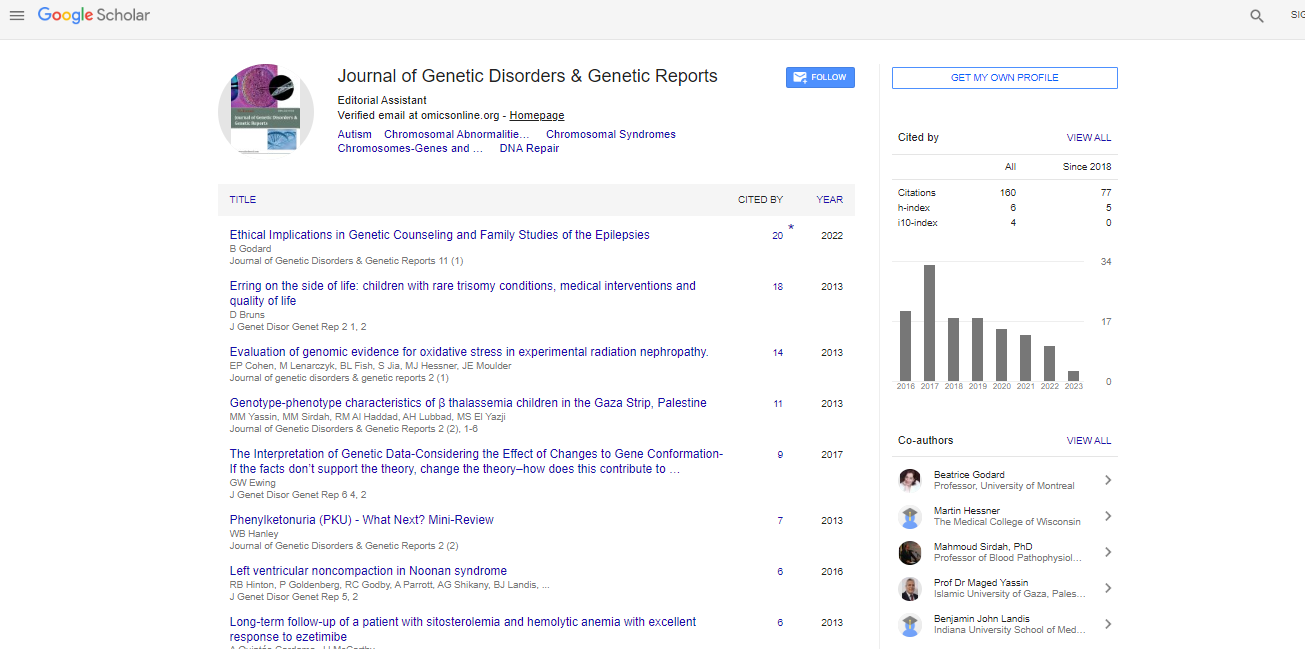Perspective, J Genet Disor Genet Rep Vol: 12 Issue: 4
Understanding Congenital Adrenal Hyperplasia: Genetic and Hormonal Complexities Unveiled
Patrica Licio*
1Genetics and Bioinformatics Research Center, University of São Paulo, São Paulo, Brazil
*Corresponding Author: Patrica Licio,
Genetics and Bioinformatics Research
Center, University of São Paulo, São Paulo, Brazil
E-mail: patricalicio8@gmail.com
Received date: 25 July, 2023, Manuscript No. JGDGR-23-113888;
Editor assigned date: 28 July, 2023, PreQC No JGDGR-23-113888(PQ);
Reviewed date: 11 August, 2023, QC No JGDGR-23-113888;
Revised date: 21 August, 2023, Manuscript No JGDGR-23-113888(R);
Published date: 28 August, 2023, DOI: 10.4172/2576-1439.1000220.
Citation: Licio P (2023) Understanding Congenital Adrenal Hyperplasia: Genetic and Hormonal Complexities Unveiled. Int J Genet Dis Genet Rep 12:4.
Abstract
Description
Congenital Adrenal Hyperplasia (CAH) is a group of inherited genetic disorders characterized by impaired adrenal hormone production. The exploration of CAH, delving into its genetic support , clinical manifestations, diagnostic strategies, medical management, and the psychosocial impact on individuals and their families.
CAH is a rare genetic disorder that affects the adrenal glands ability to produce essential hormones, particularly cortisol and aldosterone. CAH encompasses a spectrum of disorders, each with distinct genetic mutations and clinical presentations. Understanding the genetic and hormonal complexities of CAH is important for timely diagnosis, effective management, and improved outcomes for affected individuals.
Genetic basis
CAH is primarily caused by mutations in genes responsible for the production of enzymes involved in cortisol biosynthesis. The most common form, 21-hydroxylase deficiency, results from mutations in the CP21A2 gene, leading to impaired cortisol synthesis and excessive androgen production.
Clinical manifestations
Salt-wasting and simple virilizing forms: Severe CAH forms can manifest in infancy as salt-wasting crises, characterized by dehydration, vomiting, and shock. Both forms may cause virilization (masculinization) of female genitalia in affected newborns.
Non-classical form: The non-classical or late-onset form of CAH often presents with milder symptoms later in life, including hirsutism, menstrual irregularities, and infertility in females.
Adrenal crisis: Untreated or undiagnosed CAH can lead to lifethreatening adrenal crises, marked by severe symptoms and a medical emergency.
Diagnostic approaches
Newborn screening: Many countries have incorporated CAH into their newborn screening programs, allowing for early detection and intervention.
Hormone testing: Hormone tests, including cortisol and androgen level assessments, confirm the diagnosis and assess disease severity.
Genetic testing: Genetic testing identifies mutations in the CP21A2 gene, providing a definitive diagnosis and guiding genetic counseling.
Medical management
Hormone replacement therapy: Lifelong hormone replacement therapy is the important way of CAH treatment, typically involving glucocorticoids (e.g., hydrocortisone) and mineralocorticoids (e.g., fludrocortisone).
Dose adjustment: Precise dose adjustment is essential to maintain hormonal balance, prevent adrenal crises, and minimize side effects.
Monitoring and follow-up: Regular hormone level monitoring and clinical assessments are essential to optimize treatment and detect potential complications.
Psychosocial impact
Body image and self-esteem: Individuals with CAH may suffer with body image concerns, particularly if they experience virilization or other physical manifestations.
Psychological support: Psychosocial support, including counseling and participation in peer support groups, can help individuals and families navigate the emotional challenges associated with CAH.
Conclusion
Congenital Adrenal Hyperplasia is a complex genetic disorder with a wide spectrum of clinical presentations and diverse challenges. Advances in newborn screening and hormone replacement therapy have significantly improved outcomes for individuals with CAH. However, it is important to recognize the psychosocial impact of CAH and provide comprehensive care that addresses both medical and emotional aspects.
Ongoing research into the genetics of CAH and the development of targeted therapies accomplish for further advancements and improved quality of life for affected individuals. A holistic approach to CAH care, one that considers both the medical complexities and the psychosocial well-being of individuals and their families, is essential to foster resilience and ensure that those living with this condition lead healthy and fulfilling lives. By unraveling the genetic and hormonal intricacies of CAH, it can enhance our understanding and support for those affected by this challenging genetic disorder.
 Spanish
Spanish  Chinese
Chinese  Russian
Russian  German
German  French
French  Japanese
Japanese  Portuguese
Portuguese  Hindi
Hindi 



